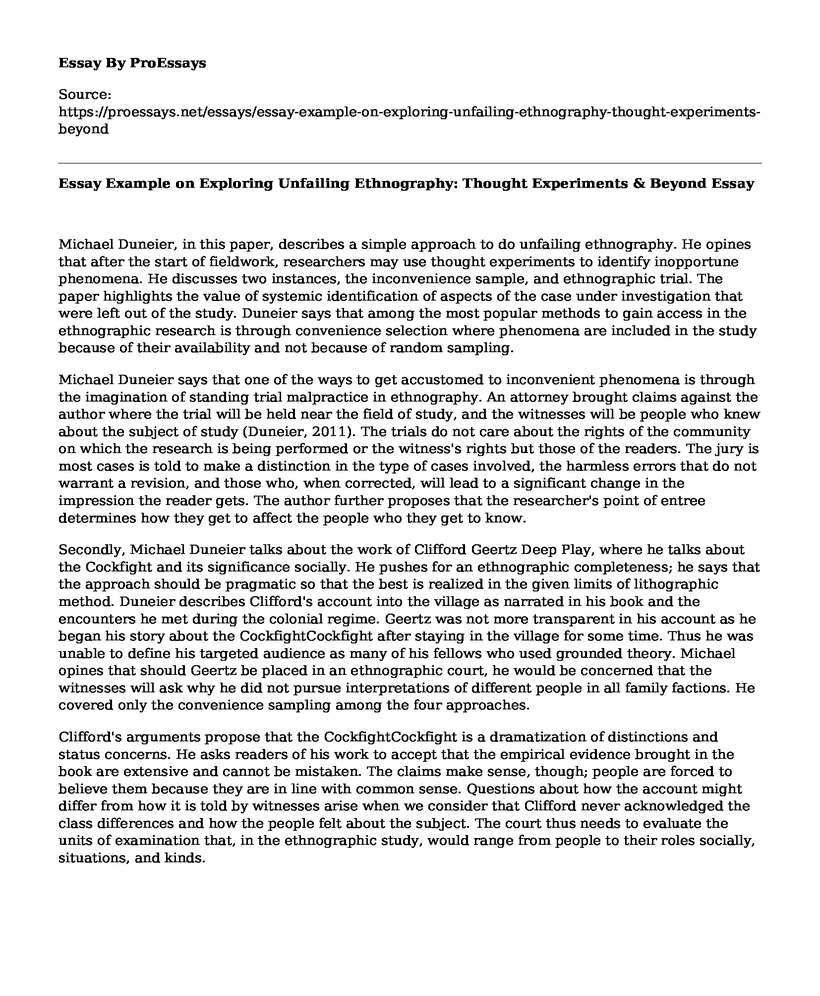Michael Duneier, in this paper, describes a simple approach to do unfailing ethnography. He opines that after the start of fieldwork, researchers may use thought experiments to identify inopportune phenomena. He discusses two instances, the inconvenience sample, and ethnographic trial. The paper highlights the value of systemic identification of aspects of the case under investigation that were left out of the study. Duneier says that among the most popular methods to gain access in the ethnographic research is through convenience selection where phenomena are included in the study because of their availability and not because of random sampling.
Michael Duneier says that one of the ways to get accustomed to inconvenient phenomena is through the imagination of standing trial malpractice in ethnography. An attorney brought claims against the author where the trial will be held near the field of study, and the witnesses will be people who knew about the subject of study (Duneier, 2011). The trials do not care about the rights of the community on which the research is being performed or the witness's rights but those of the readers. The jury is most cases is told to make a distinction in the type of cases involved, the harmless errors that do not warrant a revision, and those who, when corrected, will lead to a significant change in the impression the reader gets. The author further proposes that the researcher's point of entree determines how they get to affect the people who they get to know.
Secondly, Michael Duneier talks about the work of Clifford Geertz Deep Play, where he talks about the Cockfight and its significance socially. He pushes for an ethnographic completeness; he says that the approach should be pragmatic so that the best is realized in the given limits of lithographic method. Duneier describes Clifford's account into the village as narrated in his book and the encounters he met during the colonial regime. Geertz was not more transparent in his account as he began his story about the CockfightCockfight after staying in the village for some time. Thus he was unable to define his targeted audience as many of his fellows who used grounded theory. Michael opines that should Geertz be placed in an ethnographic court, he would be concerned that the witnesses will ask why he did not pursue interpretations of different people in all family factions. He covered only the convenience sampling among the four approaches.
Clifford's arguments propose that the CockfightCockfight is a dramatization of distinctions and status concerns. He asks readers of his work to accept that the empirical evidence brought in the book are extensive and cannot be mistaken. The claims make sense, though; people are forced to believe them because they are in line with common sense. Questions about how the account might differ from how it is told by witnesses arise when we consider that Clifford never acknowledged the class differences and how the people felt about the subject. The court thus needs to evaluate the units of examination that, in the ethnographic study, would range from people to their roles socially, situations, and kinds.
Conclusion
Michael Duneier finally opines that it is essential that ethnographers, moves towards inconvenience sampling as they have some benefits. Readers get a better understanding and interpretation of biases used in the study before it is too late. Making it a norm to inform readers why a specific sample is hard to sample in the study will enable them to understand where the bias is coming from. Duneier believes the article will help explain why some ethnographic data may be misused or used by failure to acknowledge inconvenient phenomena.
Reference
Duneier, M. (2011). How not to lie with ethnography. Sociological Methodology, 41(1), 1-11.
Cite this page
Essay Example on Exploring Unfailing Ethnography: Thought Experiments & Beyond. (2023, Jul 02). Retrieved from https://proessays.net/essays/essay-example-on-exploring-unfailing-ethnography-thought-experiments-beyond
If you are the original author of this essay and no longer wish to have it published on the ProEssays website, please click below to request its removal:
- Frozen in the Post-Heroic Age Mirrors Female Initiation, Telos Essay
- Young and Old Generation Essay
- Research Paper on Parenting Styles' Consequentialism on Adolescent Behaviors
- Essay Sample on Social Hierarchy in Tartuffe and Ottoman Empire
- Essay Sample on Native Americans & Europeans: Conflict, Trade & Geography
- Essay Example on Sexuality in Aging: Society's Taboo?
- Paper Example on Michael Ondaatje: Journey Through Mixed Cultures







